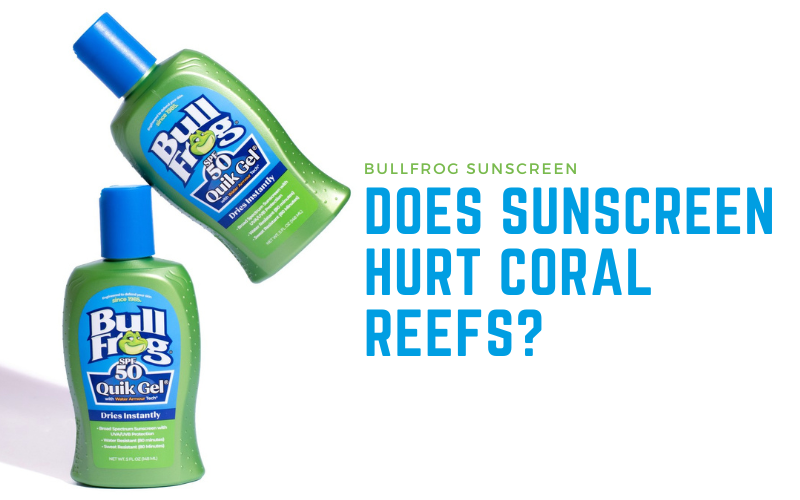
The topic of whether sunscreen harms coral reefs has become a widely discussed issue in recent years, especially among environmentally-conscious individuals. The concern arises from the fact that certain chemicals found in sunscreens, when washed off into the ocean, can have harmful effects on marine life, including coral reefs. However, the use of reef-friendly or reef-safe sunscreens has become an increasingly popular solution to this issue. Here, we will explore the topic of whether sunscreen harms coral reefs and the importance of using reef-friendly sunscreens such as Bullfrog’s Quik Gel Broad Spectrum Gel Sunscreen.

Firstly, it is important to understand why coral reefs are so vital to our ecosystem. Coral reefs are incredibly biodiverse ecosystems that provide a habitat for many species of marine life. Coral reefs also play a vital role in protecting our shores from storms and erosion. Coral reefs are one of the most important ecosystems on our planet, and they play a critical role in maintaining the health of our oceans and the world. Unfortunately, coral reefs around the world are in danger due to a variety of factors, including climate change, overfishing, and pollution which each contribute to the degradation of coral reefs. By taking action to reduce these threats and supporting organizations working to protect coral reefs, we can help to ensure that these incredible ecosystems continue to thrive for many, many years.
Coral reefs are home to a diverse range of species, with estimates suggesting that they are home to over one-quarter of all marine life. From colorful fish to sea turtles and even sharks, coral reefs provide a habitat for a wide variety of marine life, many of which are threatened by extinction. In addition to providing a home for marine life, coral reefs also act as nurseries for young fish and other creatures, supporting the ocean's food chain.
Coral reefs also play a critical role in protecting our planet from the impacts of climate change. They act as a natural barrier, protecting our shores from storms and erosion. Without coral reefs, our coastlines would be more vulnerable to the impacts of rising sea levels and increasingly severe weather events.
In addition to their ecological importance, coral reefs also have significant economic value. They are a major attraction for tourists, drawing millions of visitors each year to destinations like the Great Barrier Reef in Australia and the Caribbean. The tourism industry generated by coral reefs is worth billions of dollars each year, supporting local economies and providing jobs for thousands of people.
Despite their importance, coral reefs around the world are under threat from a variety of factors. Climate change is one of the most significant threats facing coral reefs, as rising sea temperatures and increased acidity levels can cause coral bleaching, leaving them vulnerable and susceptible to disease. One of the factors contributing to the damage of coral reefs is the presence of certain chemicals found in some sunscreens. These chemicals, such as oxybenzone and octinoxate, are known to cause coral bleaching, a process in which corals get rid of the algae that live inside them, leaving them vulnerable and susceptible to disease. Additionally, these chemicals can disrupt the development of young corals and contribute to their eventual death.
The good news is that there are alternatives to these harmful chemicals. Reef friendly or reef safe sunscreens are those that do not contain oxybenzone and octinoxate, or any other chemicals that are known to harm coral reefs. Instead, they use mineral-based ingredients like zinc oxide and titanium dioxide to provide sun protection.
Bullfrog’s Quik Gel Broad Spectrum Gel Sunscreen is a popular choice for those looking for a high-quality, reef friendly sunscreen. This sunscreen is made using a mineral-based formula that provides broad-spectrum UVA and UVB protection without harming coral reefs or other marine life. It is also water-resistant for up to 80 minutes, making it perfect for water activities such as swimming, snorkeling, and surfing.

Using reef friendly sunscreens like Bullfrog Quik Gel Broad Spectrum Gel Sunscreen is an important step in protecting our coral reefs and the marine life that depends on them. However, it is not the only step we can take. Other ways to help protect coral reefs include:
- Reducing our carbon footprint by using less energy.
- Consuming less meat.
- Using public transportation whenever possible.
We can also reduce our use of plastics, especially single-use plastics that often end up in the ocean and harm marine life.
In addition to these lifestyle changes, we can also support organizations that work to protect coral reefs, like The Coral Reef Alliance, a non-profit organization working with local communities, governments, and businesses to promote sustainable practices and raise awareness about the importance of coral reefs as well as protect and restore coral reefs around the world. Through their work, they have helped to establish marine protected areas, promote sustainable tourism, and reduce pollution and overfishing.
To protect coral reefs, we must take action to reduce the factors that threaten them. This includes reducing our carbon footprint by using less energy, consuming less meat, and using public transportation whenever possible. We can also reduce our use of plastics, especially single-use plastics that often end up in the ocean and harm marine life.
The question of whether sunscreen harms coral reefs is a valid concern, and it is important that we take steps to protect these vital ecosystems. By using reef friendly or reef safe sunscreens like Bullfrog’s Quik Gel Broad Spectrum Gel Sunscreen, we can enjoy our time in the sun without harming coral reefs or other marine life. We can also take other steps to reduce our carbon footprint, reduce our use of plastics, and support organizations working to protect coral reefs. Together, we can help to ensure that these incredible ecosystems continue to thrive for generations to come.
